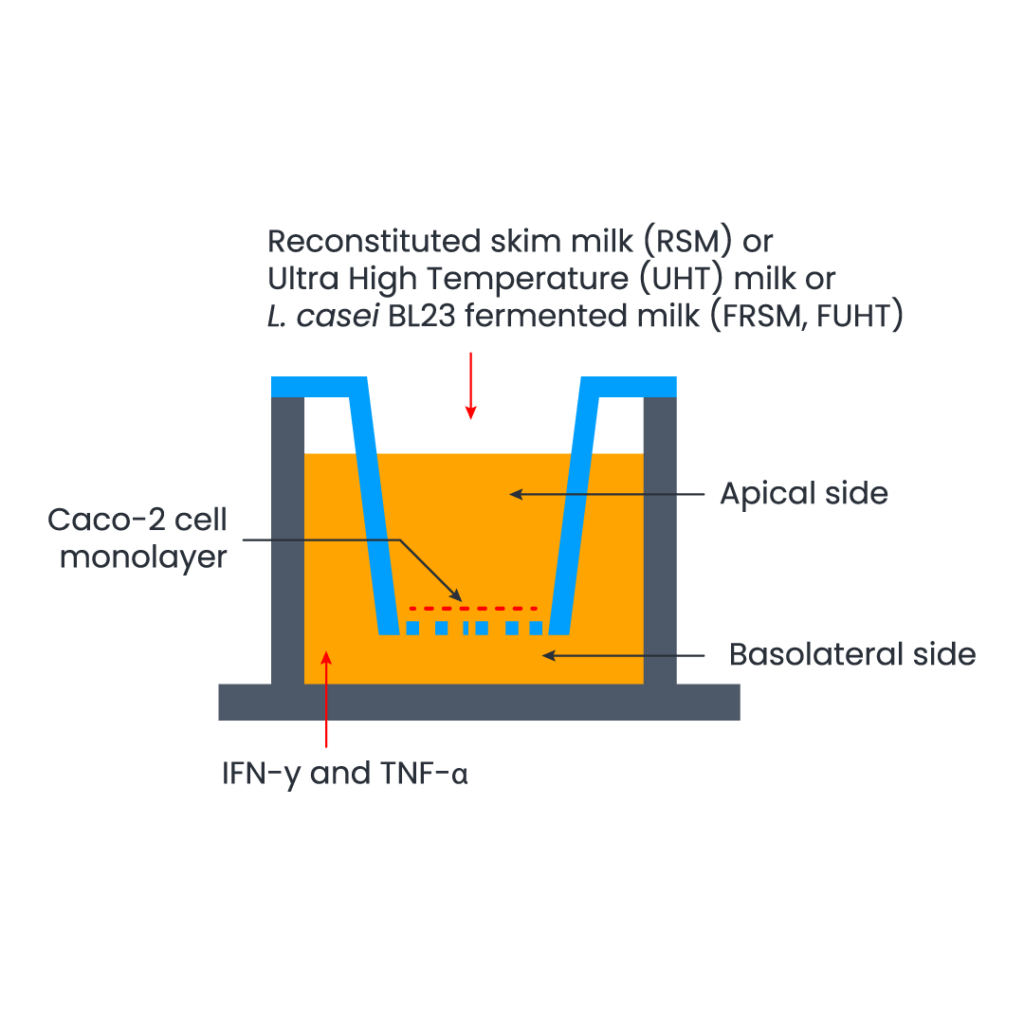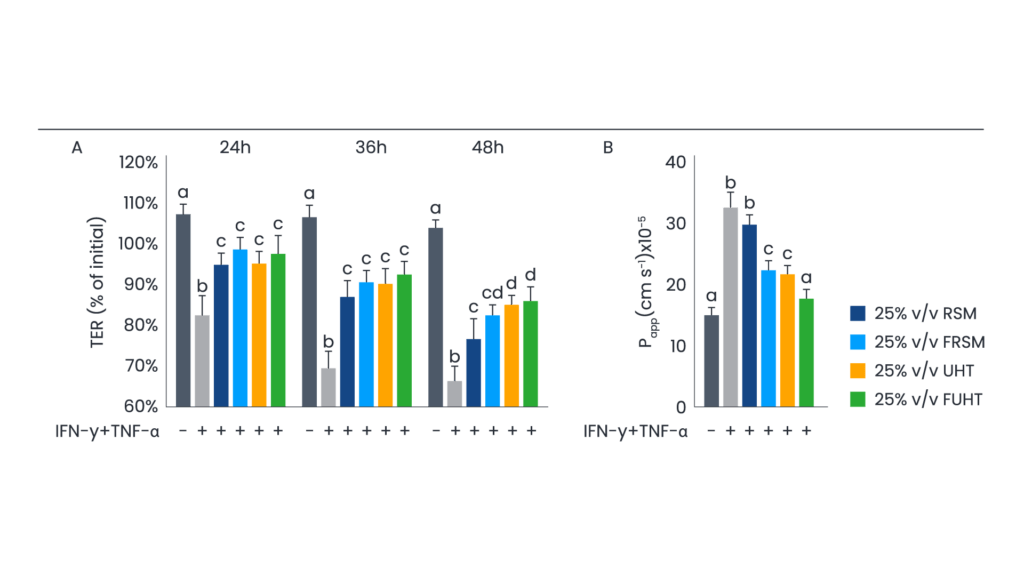Highlights
- Probiotics in fermented dairy foods (i.e., yogurt or fermented milk) can improve intestinal health
- Condition of the intestinal barrier provides information on the status of your gut health
- Cell lines can help us to elucidate the molecular mechanisms explaining the health benefits of probiotics and fermented dairy
A study of the impact of fermented dairy on gut health
Is fermented dairy good for your gut?
The importance of gut health on our overall wellbeing is just starting to be understood. An unhealthy gut can lead to localized and systemic inflammation that is associated with diseases such as obesity, irritable bowel syndrome, brain disorders, and atherosclerotic cardiovascular disease. Your diet can influence the health of your gut, so researchers are working to understand how functional foods can prevent or treat diseases linked to an unhealthy gut.
The intestinal epithelial barrier
Your overall wellbeing can be influenced by the health of the intestinal epithelial barrier within your gut. The gastrointestinal tract is lined with epithelial cells that provide a semipermeable barrier between the lumen and body tissues. This barrier enables the appropriate absorption of nutrients while keeping the harmful substances within the lumen. Disruption to the intestinal barrier can lead to both localized and systemic inflammation that can deteriorate your overall health. Diet can affect intestinal barrier health, but the exact molecular mechanisms explaining how specific dietary components influence the barrier is still unclear.
Does the consumption of probiotic-fermented dairy impact the intestinal epithelial barrier?
Supplementing diet with probiotic products may be beneficial to gut health. Probiotics are defined as “live microorganisms which when administered in adequate amounts confer a health benefit on the host” and specific strains have been shown to improve intestinal barrier function. It is common to see probiotics delivered in dairy products or contribute to the fermentation of dairy products (i.e., yogurt) for consumers. There is ongoing research to determine the impact of probiotic-fermented dairy on gut health and specifically on the intestinal epithelial barrier.
An in vitro model to study the intestinal barrier
To study the intestinal barrier, scientists can grow intestinal epithelial cells in petri dishes or plates. Many studies utilize the Caco-2 cell line, which are colorectal adenocarcinoma cells that can spontaneously differentiate to have similar morphological and functional features as small bowel enterocytes. The Caco-2 cells are grown into monolayers on semipermeable inserts to represent the intestinal epithelial layer in our gut. To evaluate monolayer integrity, scientists measure the transepithelial electrical resistance (TER) across the monolayer. A greater TER value indicates an increased barrier integrity. Scientists can also determine the paracellular permeability of the monolayer by measuring the flux of specific probes across the monolayer. Greater flux equates to increased paracellular permeability.

Figure 1. Transepithelial electrical resistance (TER) assay design using Caco-2 cell monolayer. This TER assay is set up to test the effects of L. casei BL23 fermented milk on the integrity of the intestinal epithelium.
Milk fermented by Lacticaseibacillus casei strain BL23 prevents cytokine-induced damage to the intestinal epithelial barrier
Researchers utilized the Caco-2 model to study the protective effects of milk fermented by probiotic strain L. casei BL23. It is known that pro-inflammatory cytokines, IFNγ and TNF⍺, disrupt the Caco-2 monolayer, which is characterized by a drop in TER and increase in paracellular flux. However, the fermented ultra-high-temperature-pasteurized milk provided protection from cytokine-induced drop in TER and increase in flux (Figure 2). This study suggests that probiotic-fermented milk may help preserve gut health by protecting the intestinal barrier.

Figure 2. Inflammation was reduced in the Caco-2 cell barrier as a result of exposure to BL23-fermented milk. BL23 fermented milk cultures were diluted to 25% in standard cell culture medium and applied to the apical side of the monolayer 3 hours before cytokine exposure. (A) TER measurements were taken 24, 36, and 48 hours after exposure to TNF-α. (B) Paracellular permeability was measured 48 hours after TNF-α exposure. RSM = reconstituted skim milk; FRSM = fermented RSM; UHT = Ultra-high temperature-pasteurized milk; FUHT = fermented UHT.11
Conclusion
Studies have shown that probiotics in fermented dairy foods can improve intestinal health, assist in treatment of diarrheal disease, boost the immune response, reduce symptoms of lactose intolerance, and reduce the risks of cancer. The condition of the intestinal barrier provides partial, but important, information on the status of your gut health. In vitro models using cell lines, such as the Caco-2 cell line, can help us to further elucidate the molecular mechanisms explaining the health benefits of probiotics and fermented dairy.
References
- Bischoff, S. C. ‘Gut health’: A new objective in medicine? BMC Med. 9, 1–14 (2011).
- van den Munckhof, I. C. L. et al. Role of gut microbiota in chronic low-grade inflammation as potential driver for atherosclerotic cardiovascular disease: a systematic review of human studies. Obesity Reviews vol. 19 1719–1734 (2018).
- Serra, D., Almeida, L. M. & Dinis, T. C. P. The Impact of Chronic Intestinal Inflammation on Brain Disorders: the Microbiota-Gut-Brain Axis. Mol. Neurobiol. 56, 6941–6951 (2019).
- Khoshbin, K. & Camilleri, M. Effects of dietary components on intestinal permeability in health and disease. American Journal of Physiology – Gastrointestinal and Liver Physiology vol. 319 G589–G608 (2020).
- Hill, C. et al. Expert consensus document: The international scientific association for probiotics and prebiotics consensus statement on the scope and appropriate use of the term probiotic. Nat. Rev. Gastroenterol. Hepatol. 11, 506–514 (2014).
- Bron, P. A. et al. Can probiotics modulate human disease by impacting intestinal barrier function? British Journal of Nutrition vol. 117 93–107 (2017).
- Lea, T. Caco-2 cell line. in The Impact of Food Bioactives on Health: In Vitro and Ex Vivo Models 103–111 (Springer International Publishing, 2015). doi:10.1007/978-3-319-16104-4_10.
- Zhai, Z., Torres-Fuentes, C., Heeney, D. D. & Marco, M. L. Synergy between Probiotic Lactobacillus casei and Milk to Maintain Barrier Integrity of Intestinal Epithelial Cells. J. Agric. Food Chem. 67, 1955–1962 (2019).
- Kechangia, M. et al. Health Benefits of Probiotics: A Review. ISRN Nutr. 2013 Jan 2;2013:481651. doi: 10.5402/2013/481651.





